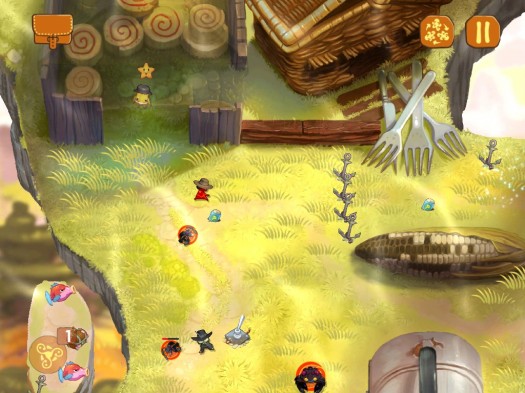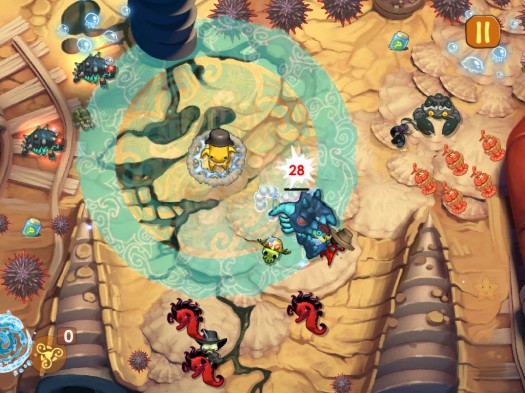![]() Game business crept into the game design of Squids, and the game’s creator The Game Bakers will be the first to tell you that its RPG had an identity crisis. It was difficult without being rewarding, which made the free-to-play elements feel like they were necessary solutions as opposed to merely options. Squids Wild West isn’t like this; it’s a premium game, and as a result, it’s a cohesive whole with much stronger and coherent messaging.
Game business crept into the game design of Squids, and the game’s creator The Game Bakers will be the first to tell you that its RPG had an identity crisis. It was difficult without being rewarding, which made the free-to-play elements feel like they were necessary solutions as opposed to merely options. Squids Wild West isn’t like this; it’s a premium game, and as a result, it’s a cohesive whole with much stronger and coherent messaging.
This change doesn’t mean Wild West won’t straddle two business models. It has in-app purchases similar to the ones we saw in the original game, but there are no choke points and no pushes to pay real money to solve problems.
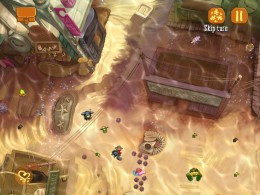 Game designer Emeric Thoa tells us that the key difference between the two games is in the messaging. In our e-mail conversation, he brings up a few specific examples. You’ll never be told to head to the in-game store, for instance, whenever you lose fights in Wild West. You’ll also keep all the pearls you’ve earned if your team wipes. And, you’ll get the option to drop the game’s difficulty if the fight you’re on proves to be much too tough. Functionally, we’ve noticed that Wild West is not as linear; you’ll never feel tied down or at the game’s mercy.
Game designer Emeric Thoa tells us that the key difference between the two games is in the messaging. In our e-mail conversation, he brings up a few specific examples. You’ll never be told to head to the in-game store, for instance, whenever you lose fights in Wild West. You’ll also keep all the pearls you’ve earned if your team wipes. And, you’ll get the option to drop the game’s difficulty if the fight you’re on proves to be much too tough. Functionally, we’ve noticed that Wild West is not as linear; you’ll never feel tied down or at the game’s mercy.
The hands-off approach makes this a better game, and as we play, we wonder if the overall design wasn’t informed by the decision to keep IAP pushed into a corner. Tougher fights seem to net higher rewards. Pearls seem to flow more freely. Back-tracking has a point now, too, as you’ll get similar rewards to the first time you went through a level.
These are important changes that make Wild West feel much more like a game, as opposed to a cool game with a bummer business model. During our session with it, we never even considered its IAP functionality, which speaks volumes.
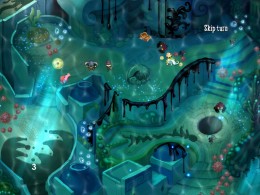 Outside of the business model, Wild West is a faithful follow-up to the original Squids, as it combines the same free-flowing action model of the first to turn-based action. It doesn’t have grids. Instead, environments are open and boast real-time hazards that can affect you or the enemy in disruptive ways. Also, movement is chaotic. You fling squids instead of move them space by space, bashing them into and off of enemies and walls. A beefy physics engine informs the way you approach conflicts; as a whole, you can think of borders like backboards and your heroes as pinballs. It’s an interesting mix, which makes for much more fluid and unpredictable action.
Outside of the business model, Wild West is a faithful follow-up to the original Squids, as it combines the same free-flowing action model of the first to turn-based action. It doesn’t have grids. Instead, environments are open and boast real-time hazards that can affect you or the enemy in disruptive ways. Also, movement is chaotic. You fling squids instead of move them space by space, bashing them into and off of enemies and walls. A beefy physics engine informs the way you approach conflicts; as a whole, you can think of borders like backboards and your heroes as pinballs. It’s an interesting mix, which makes for much more fluid and unpredictable action.
Action in Wild West comes at a steadier clip and richer scenario design bolsters its increased pacing. The game’s first chapter, for example, really gets into the positive and negative relationship you’ll have with the game’s environmental hazards. Levels in the late game just functionally do more, as they present objectives or just offer much more to do in terms of raw design. Another mission in the first chapter, for example, has you pulling levers while fighting off bad guys. Another has you using sea horse mounts to knock shelled enemies onto their backs so you can damage their squishy middle parts with your other, unmounted, multi-armed heroes.
The sea horses are just one new element in a game full of iterative additions. There’s boss fights, new enemy types, and many more squids with different abilities, to name a few minor examples. But more interestingly, it feels like The Game Bakers are really stepping up how you use in-level items. They’re scattered everywhere now, and they tend to regenerate at a steady clip. Identifying and getting to these items can have massive impacts on how battles progress. For instance, if you grab a shell, you can’t take hits at the end of your turn. Picking one up on the way to a confrontation is huge.
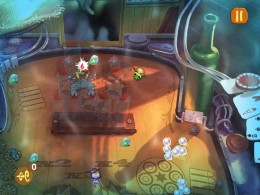 There’s also an inventory mechanic. At the store, where you use your pearls to level up your dudes, you can buy single-use items to use in battle. These range from health and resurrect items, to even summon monsters. Having problems? Whip one of those bad boys out. You can also find them in in-game treasure chests, if you’re the exploring type.
There’s also an inventory mechanic. At the store, where you use your pearls to level up your dudes, you can buy single-use items to use in battle. These range from health and resurrect items, to even summon monsters. Having problems? Whip one of those bad boys out. You can also find them in in-game treasure chests, if you’re the exploring type.
If you’re wondering what’s up with the theming like we were, by the way, know that the Squids universe is split into seven kingdoms. The Wild West is one of them. In this, the black ooze is still spreading and blotting out the Squids underwater haven. You follow the team, and a few new members, as they venture into this western world to find answers and hopefully stop the ooze from progressing.
There’s a lot more to note with Wild West, but we didn’t spy a single thing that felt more important than its new, clearer business model. Wild West is a fresh canvas and instead of doubling-down on a flawed monetization strategy, The Game Bakers is backing off and doing something even better: it’s making a fluid, normal-feeling game.
Wild West is due out very shortly on iPad and we’ll have a review for your eyeholes soon. Stay tuned.
